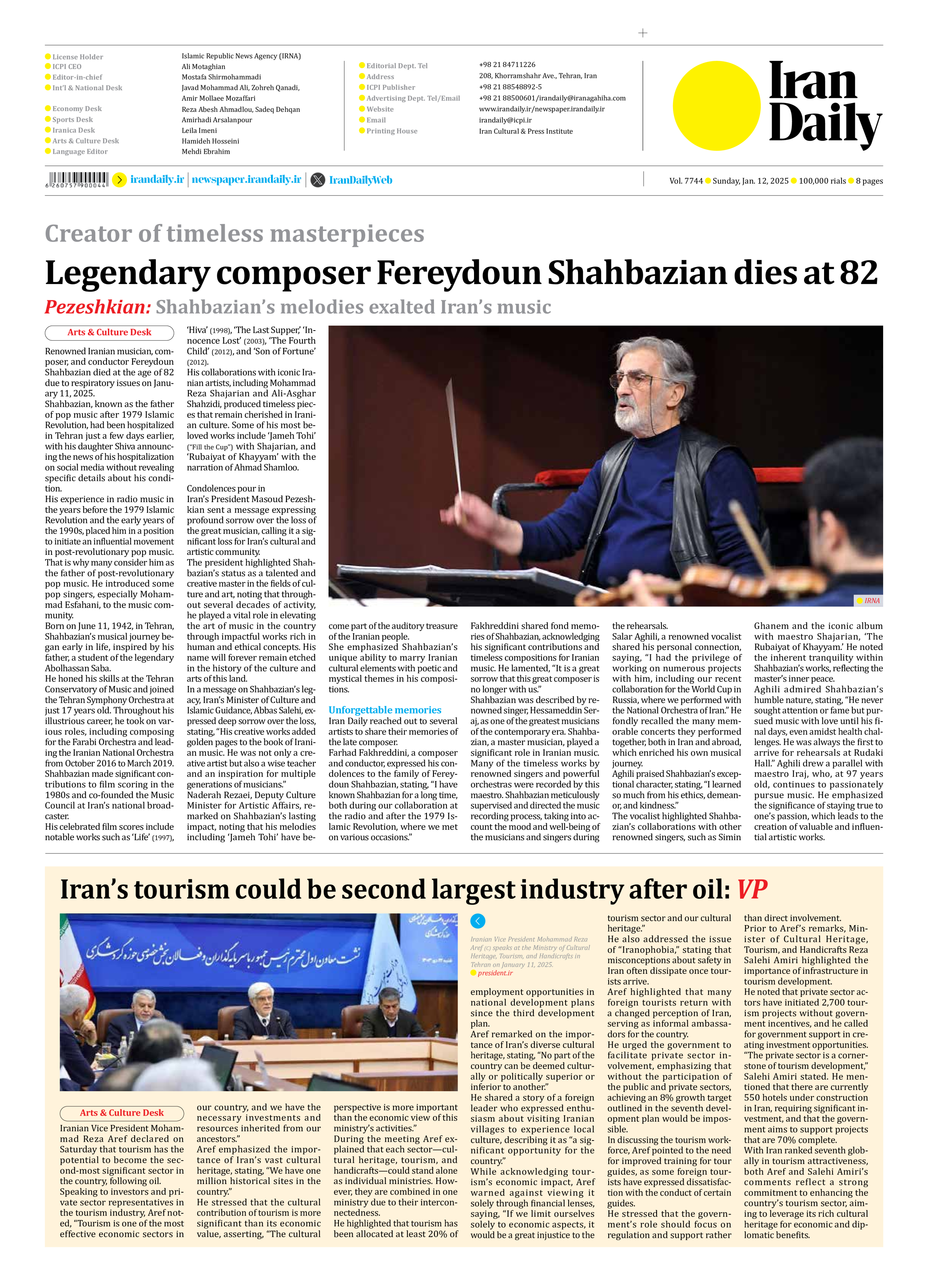
Creator of timeless masterpieces
Legendary composer Fereydoun Shahbazian dies at 82
Pezeshkian: Shahbazian’s melodies exalted Iran’s music
Renowned Iranian musician, composer, and conductor Fereydoun Shahbazian died at the age of 82 due to respiratory issues on January 11, 2025.
Shahbazian, known as the father of pop music after 1979 Islamic Revolution, had been hospitalized in Tehran just a few days earlier, with his daughter Shiva announcing the news of his hospitalization on social media without revealing specific details about his condition.
His experience in radio music in the years before the 1979 Islamic Revolution and the early years of the 1990s, placed him in a position to initiate an influential movement in post-revolutionary pop music. That is why many consider him as the father of post-revolutionary pop music. He introduced some pop singers, especially Mohammad Esfahani, to the music community.
Born on June 11, 1942, in Tehran, Shahbazian’s musical journey began early in life, inspired by his father, a student of the legendary Abolhassan Saba.
He honed his skills at the Tehran Conservatory of Music and joined the Tehran Symphony Orchestra at just 17 years old. Throughout his illustrious career, he took on various roles, including composing for the Farabi Orchestra and leading the Iranian National Orchestra from October 2016 to March 2019.
Shahbazian made significant contributions to film scoring in the 1980s and co-founded the Music Council at Iran’s national broadcaster.
His celebrated film scores include notable works such as ‘Life’ (1997), ‘Hiva’ (1998), ‘The Last Supper,’ ‘Innocence Lost’ (2003), ‘The Fourth Child’ (2012), and ‘Son of Fortune’ (2012).
His collaborations with iconic Iranian artists, including Mohammad Reza Shajarian and Ali-Asghar Shahzidi, produced timeless pieces that remain cherished in Iranian culture. Some of his most beloved works include ‘Jameh Tohi’ (“Fill the Cup”) with Shajarian, and ‘Rubaiyat of Khayyam’ with the narration of Ahmad Shamloo.
Condolences pour in
Iran’s President Masoud Pezeshkian sent a message expressing profound sorrow over the loss of the great musician, calling it a significant loss for Iran’s cultural and artistic community.
The president highlighted Shahbazian’s status as a talented and creative master in the fields of culture and art, noting that throughout several decades of activity, he played a vital role in elevating the art of music in the country through impactful works rich in human and ethical concepts. His name will forever remain etched in the history of the culture and arts of this land.
In a message on Shahbazian’s legacy, Iran’s Minister of Culture and Islamic Guidance, Abbas Salehi, expressed deep sorrow over the loss, stating, “His creative works added golden pages to the book of Iranian music. He was not only a creative artist but also a wise teacher and an inspiration for multiple generations of musicians.”
Naderah Rezaei, Deputy Culture Minister for Artistic Affairs, remarked on Shahbazian’s lasting impact, noting that his melodies including ‘Jameh Tohi’ have become part of the auditory treasure of the Iranian people.
She emphasized Shahbazian’s unique ability to marry Iranian cultural elements with poetic and mystical themes in his compositions.
Unforgettable memories
Iran Daily reached out to several artists to share their memories of the late composer.
Farhad Fakhreddini, a composer and conductor, expressed his condolences to the family of Fereydoun Shahbazian, stating, “I have known Shahbazian for a long time, both during our collaboration at the radio and after the 1979 Islamic Revolution, where we met on various occasions.”
Fakhreddini shared fond memories of Shahbazian, acknowledging his significant contributions and timeless compositions for Iranian music. He lamented, “It is a great sorrow that this great composer is no longer with us.”
Shahbazian was described by renowned singer, Hessameddin Seraj, as one of the greatest musicians of the contemporary era. Shahbazian, a master musician, played a significant role in Iranian music. Many of the timeless works by renowned singers and powerful orchestras were recorded by this maestro. Shahbazian meticulously supervised and directed the music recording process, taking into account the mood and well-being of the musicians and singers during the rehearsals.
Salar Aghili, a renowned vocalist shared his personal connection, saying, “I had the privilege of working on numerous projects with him, including our recent collaboration for the World Cup in Russia, where we performed with the National Orchestra of Iran.” He fondly recalled the many memorable concerts they performed together, both in Iran and abroad, which enriched his own musical journey.
Aghili praised Shahbazian’s exceptional character, stating, “I learned so much from his ethics, demeanor, and kindness.”
The vocalist highlighted Shahbazian’s collaborations with other renowned singers, such as Simin Ghanem and the iconic album with maestro Shajarian, ‘The Rubaiyat of Khayyam.’ He noted the inherent tranquility within Shahbazian’s works, reflecting the master’s inner peace.
Aghili admired Shahbazian’s humble nature, stating, “He never sought attention or fame but pursued music with love until his final days, even amidst health challenges. He was always the first to arrive for rehearsals at Rudaki Hall.” Aghili drew a parallel with maestro Iraj, who, at 97 years old, continues to passionately pursue music. He emphasized the significance of staying true to one’s passion, which leads to the creation of valuable and influential artistic works.







